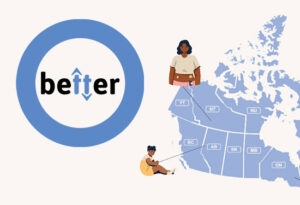
Living with type 1 diabetes (T1D) is challenging, and many people have difficulty committing the time and effort required to manage their blood sugar levels with their other competing life demands. While frequent meetings with a health care provider result in better glucose control, it is often hard for individuals and families to commit to the traditional health care’s rigorous schedules and long waiting lists. At times this can result in patients not getting the support they need to ensure they’re managing their diabetes correctly and responsibly.

Dr. Gillian Booth, a JDRF-funded scientist at the Centre for Urban Health Solutions within the Li Ka Shing Knowledge Institute of St. Michael’s Hospital in Toronto, and a team of researchers are aiming to improve glucose control and patient experiences by using modern technologies to optimize the way health care is delivered to people with T1D.
She and her colleagues are conducting a clinical study in several adult diabetes centres using a combination of brief and frequent virtual ‘face-to-face’ visits with the person’s diabetes care team and a web-based platform to provide patients with readily available self-management education, tools and resources. The virtual visits will use videoconferencing technology that can be securely accessed free of charge from any personal device (PC, tablet, smart phone). These interventions will facilitate discussions around blood sugar patterns, diabetes self-management, coping strategies, personalized goals and action plans.
Since young adults face unique challenges in managing T1D (particularly as they transition from pediatric to adult care centres), the supports and services afforded through this study will be tailored by age group—young adults will receive additional aids to help them transition to adult clinics, as well as customized web-based content. The researchers will seek feedback from participants and health care providers throughout the study to make sure this program meets the patients’ needs and can be easily adopted in real-world settings.
If successful, this modern approach to delivering T1D care and self-management support has the potential to enhance glucose control, while at the same time improve patient experiences within the health care system.
For more informative articles on health and type 1 diabetes, visit our JDRF Blog.




